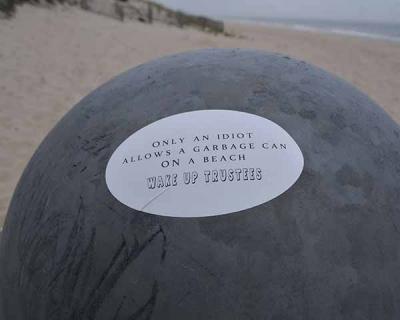Move Your Cans, Trustees to Tell Village

The East Hampton Town Trustees were on the receiving end this week of strong words about trash left on East Hampton Village beaches, and in turn resolved to take the matter up with the village.
Dell Cullum, a photographer and wildlife-removal specialist, displayed a large plastic bag containing debris he had collected, before Tuesday’s meeting began, between Egypt and Wiborg’s Beaches in the village. Mr. Cullum, who organized an ocean beach cleanup in April, thanked the trustees for their participation in the cleanup but added, “I think it’s safe to say I begged you to keep the friggin’ garbage cans off the beach.”
The trustees manage the beaches and bottomlands in the village, as well as others in the town except for Montauk, on behalf of the public.
Bill Taylor, a trustee, observed that receptacles had been removed from town beaches several years ago “because they were a big mess.” The situation improved as a result, he said.
Mr. Cullum contends that garbage receptacles placed directly on the sand only encourage litter. Village employees cannot keep up with the volume of trash left in and around them, he said, and animals and strong winds then compound the problem. “I work very, very hard to clean your beaches,” he told the trustees. “I think in return, there should be some respect as far as helping me not make it so easy for garbage to get on the beaches.”
People do not use the receptacles, he said, and if they do, they are filled and overflow. Left overnight, the trash “gets picked at by the raccoons, knocked over by the elements,” and “in the morning, the seagulls tear it to shreds. I don’t think that’s necessary or a proper way to deal with this trash issue that’s really a crisis.”
Mr. Cullum is in favor of receptacles at the road end, but not on the beach itself. If village staff cannot manage them at the road ends, he asked, why place them halfway to the water’s edge? “I’m trying to solve the problem, and you’re trying to make it worse,” he told the trustees. “It’s not your fault, but it is because of what you’re allowing them to do,” he said, referring to village officials.
While the trustees had been unaware that the village allows receptacles on its beaches, Diane McNally, the trustees’ presiding officer, told Mr. Cullum, she took exception to his characterization of the trustees’ and village’s management. The receptacles are emptied twice daily, she said. “From my perspective, the town and village are using all the resources they’ve got to try and stay on this garbage issue.”
“We don’t have a bay constable,” said Nat Miller, a trustee. “We need enforcement.”
Deborah Klughers, a trustee who, like Mr. Cullum, is a member of the town’s litter committee, said that she agreed with Ms. McNally but also with Mr. Cullum, in that receptacles should not be on the beaches, and suggested that the trustees ask that the village remove them. “This could be undone,” she said of a change in policy. “I don’t know what the bad thing could be to try this.”
Ms. Klughers also complained that a memo to the town board proposing that fines for littering on beaches be increased had gone unanswered. She later attended a town board meeting, she said, and asked for a public hearing on the proposal. “I don’t know what else to do,” she said. “I don’t understand what the problem is.”
The problem, Mr. Miller answered, “is they’re afraid to give tourists tickets.”
Ms. McNally disagreed with her colleagues. “By removing the cans, I don’t think you’re going to solve the problem,” she said.
Over her dissenting vote, however, the trustees voted to ask that the receptacles be removed from the village beaches and that enforcement be increased. “You have to send a message,” Mr. Miller said.
The trustees will ask that penalties in the section of town code pertaining to beaches be amended to match those in the section pertaining to littering in public places. In the former, the penalty for a first offense is a fine of between $100 and $250, imprisonment for up to 15 days, or both. The latter assesses a fine of between $250 and $1,000, imprisonment for no more than six months, or both. “You’ve got to set a minimum that’s really high,” said John Courtney, the trustees’ attorney. “Everybody plea-bargains.”
In other news from the meeting, Ms. McNally announced that the trustees’ next meeting would be televised. LTV will provide cameras to film the board members and anyone addressing them, the latter now required to stand at a podium. The furnishings in the small room at the Donald Lamb Building in Amagansett where the trustees meet have been reconfigured to accommodate the new arrangement.
Ms. McNally also told her colleagues that the trustee-owned pumpout boats, which are stationed in Three Mile Harbor in East Hampton and in Lake Montauk, had provided an invaluable service to the waterways in 2014. Like all open waters of the Peconic Estuary, both are no-discharge zones.
Last year, free of charge, the boats pumped 52,400 gallons of sewage from boats in Lake Montauk and 22,205 gallons in Three Mile Harbor.
